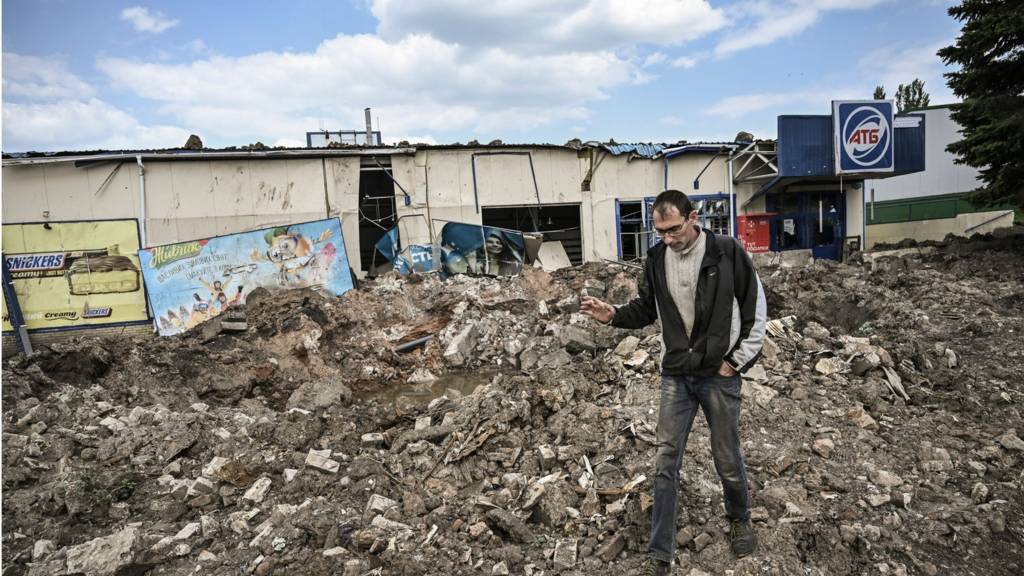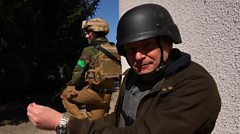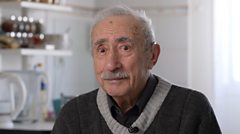
Shelling constant in Severodonetsk as Russian forces advance
Updates from BBC correspondents: Joe Inwood, James Waterhouse and Abdujalil Abdurasulov in Kyiv, Laura Bicker and Hugo Bachega in Dnipro, Jeremy Bowen in Donbas, and Steve Rosenberg in Moscow
Related Video and Audio
RTL






Live Reporting
Edited by Chris Giles and George Wright
All times stated are UK
Get involved

Getty ImagesCopyright: Getty Images A young boy sits in front of a damaged building after a strike in Kramatorsk in the Donbas regionImage caption: A young boy sits in front of a damaged building after a strike in Kramatorsk in the Donbas region -
The cities of Severodonetsk and Lysychansk in the Donbas region have come under constant bombardment as Russia tries to encircle them
-
Fighting has reached the outskirts of Severodonetsk, a key Russian target, but a senior Ukrainian official has denied reports that a vital road linking Ukrainian-controlled areas in the east has been blocked from the rest of the country by Russian forces
-
Russia said it will allow ships carrying food out of blockaded ports if sanctions are lifted
-
Ukraine is a major grain producer and the the West accuses the Russian military of holding hostage food supplies for millions around the world
-
President Vladimir Putin has issued an order to simplify the procedure of handing Russian citizenship to residents of Zaporizhzhia and Kherson regions in Ukraine's south
-
Ukraine called the plan "criminal" and a violation of international law


Getty ImagesCopyright: Getty Images 
EPACopyright: EPA Kherson is the first and only major Ukrainian city occupied by RussiaImage caption: Kherson is the first and only major Ukrainian city occupied by Russia 
.Copyright: . 

ReutersCopyright: Reuters Russia has flattened large areas of Severodonetsk during weeks of bombardmentImage caption: Russia has flattened large areas of Severodonetsk during weeks of bombardment 
.Copyright: . 
EPACopyright: EPA 
ReutersCopyright: Reuters 

EPACopyright: EPA Romanian President Klaus Iohannis (L) welcomes Britain's Prince Charles during their official meeting at Cotroceni Presidential Palace in BucharestImage caption: Romanian President Klaus Iohannis (L) welcomes Britain's Prince Charles during their official meeting at Cotroceni Presidential Palace in Bucharest 

Liam KennedyCopyright: Liam Kennedy Casey, seen here in a village near Kharkiv, has been in Ukraine for two monthsImage caption: Casey, seen here in a village near Kharkiv, has been in Ukraine for two months 
Getty ImagesCopyright: Getty Images Russian forces are seeking to take control of SeverodonetskImage caption: Russian forces are seeking to take control of Severodonetsk 
Video caption: Ros Atkins on... Russia's food warRos Atkins on... Russia's food war 
.Copyright: . 
EPACopyright: EPA This photo taken at the end of April showed damage close to the sea port in MariupolImage caption: This photo taken at the end of April showed damage close to the sea port in Mariupol 
.Copyright: . 
ReutersCopyright: Reuters 

.Copyright: . 
ReutersCopyright: Reuters
Latest PostThat's all for now...
We are pausing our live coverage of the war in Ukraine for now. We'll be back in the morning, Ukraine time.
We're pausing our live coverage shortly
But before we go, here's a recap of the day's main developments:
Russia raises army age limit to 50
Olga Ivshina
BBC Russian senior correspondent
The Russian parliament has passed a law raising the age limit for people signing up to the army to 50.
It follows ongoing attempts by Russian officials to recruit more soldiers as Russian casualties in Ukraine mount.
Under current legislation, only Russians aged 18 to 40 and foreigners aged 18 to 30 can enlist as professional soldiers in the Russian military.
“Highly professional specialists are needed to use high-precision weapons and operate weapons and military equipment” and such specialists may be aged 40 to 45, said a note accompanying the draft bill.
According to the new law Russian citizens and foreigners up to the age of 50 will be able to sign a contract with the military.
The note said the amendment would also help attract those in civilian professions to join the army, including medics, engineers and communications experts.
Since the start of the war in Ukraine, the Russian Ministry of Defence and the so-called Wagner private military company have launched a vast and persistent campaign to recruit new soldiers both officially and unofficially.
Based on open sources, BBC Russian has identified at least 46 Russians aged over 45 who have been killed in Ukraine after the start of the invasion. This includes a 63-year-old retired general, who was shot down operating a Su-25 fighter jet.
Ukraine calls Russia's passport plan for occupied areas 'criminal'
Russia's plan to make it easier for Ukrainians living in Russian-controlled regions of Ukraine to receive Russian citizenship violates international law, Kyiv says.
The government accused the Kremlin of "criminal" behaviour.
President Vladimir Putin has issued an order to simplify the procedure of handing Russian citizenship to residents of Zaporizhzhia and Kherson regions in Ukraine's south.
Kherson is the first and only major Ukrainian city occupied by Russia.
"The illegal issuing of passports... is a flagrant violation of Ukraine's sovereignty and territorial integrity, as well as norms and principles of international humanitarian law," the Ukrainian foreign ministry said in a statement.
Putin’s army finally finding some success in eastern Donbas region
Joe Inwood
Reporting from Kyiv
“Quantity has a quality of its own.”
It’s said these words were used by Joseph Stalin to describe the Soviet approach to war. Throw enough bodies at a conflict and eventually you will overwhelm the enemy. It worked for the Red Army against the Nazis and the Finnish. In both wars they lost more men, but eventually came out on top
They are words that also apply today.
Vladimir Putin’s army is finally finding some success, as his forces make breakthroughs in the eastern Donbas region. Over the last few days they have captured a number of towns and villages, forcing the Ukrainians to retreat to more defensible positions.
They are doing it with sheer weight of numbers. Not just men, but artillery, armour and air power.
This morning the Governor of Luhansk region described the numbers they were coming up against as “insane”. President Zelensky told ABC News his men were outnumbered 7-to-1 in the region.
The current Russian targets are the twin cities of Severodonetsk and Lysychansk. There are thought to be thousands of Ukrainian forces there, dug in and prepared for a long battle. But, they are facing the prospect of being cut off… then destroyed by the sheer weight of the Russian forces.
If that happens, some of Ukraine’s best troops will be taken out of the war.
But, not all is lost for the Ukrainians. They have huge quantities of international military support, both promised and en route, much of it far more advanced than that currently on display in the Donbas.
The question is, can they bring that quality to bear, before the Russian quantity overwhelms them?
Battle for key road as fighting reaches Ukraine city
A senior figure in eastern Ukraine has denied reports that a vital road linking Ukrainian-controlled areas in the east has been blocked from the rest of the country by Russian forces.
"Luhansk has not been cut off," said the region's military administration head, Serhiy Haidai.
Fighting has reached the outskirts of the big city of Severodonetsk, a key Russian target.
If they capture the road to Bakhmut then the city could be surrounded.
Haidai said that while the route to the south-west of Severodonetsk had come under fire, humanitarian aid was still getting through.
Things were far bleaker in Severodonetsk itself, which was being shelled 24 hours a day and Russian forces were close enough to use mortar rounds as well as artillery and aerial bombing, he told the BBC.
Six people were killed in Russian bombardment on Tuesday, he said on his Telegram feed.
If Russia captures the neighbouring town of Lysychansk then the whole Luhansk region will be in its hands.
Read more here.
Putin visits wounded Russian soldiers
Russian President Vladimir Putin has met with soldiers wounded in Moscow's military campaign in Ukraine and hailed them as heroes.
It's the first meeting of its kind since Russia's invasion of Ukraine.
The meetings took place at Moscow's Mandryka military hospital.
Putin shook hands with the men and asked one soldier about his baby son, telling him: "He will be proud of his dad."
"These are people who are risking their health and lives for the sake of the people and children of Donbas, for the sake of Russia. They are all heroes," he told officials after meeting the wounded men.
Prince Charles visits Romania to show solidarity for Ukrainian refugees
Sean Coughlan
Reporting from Bucharest
This is the closest to the conflict in Ukraine that any senior member of the British Royal Family has come so far.
Prince Charles has travelled to Romania to show solidarity for the refugees and the aid agencies trying to help them.
It’s a cause close to his heart and he’s visiting a convention centre outside Bucharest being used to distribute food, clothes and advice.
He’s in a country with a war on its doorstep. Almost a million refugees have come across the border into Romania.
Thousands more are arriving every single day and aid workers have been emphasising the sheer scale of this mass migration. More than six million people have left Ukraine in three months.
It’s also a refugee crisis in a modern European setting. Many are keeping moving, stopping temporarily in neighbouring Romania before heading further afield.
Those that are staying are not in camps or rows of tents - but in hostels, hotels, people’s houses, spaces in public buildings.
There’s been a generous effort to welcome these displaced people, with volunteers meeting arrivals at the railway station.
But if international interest wanes, and compassion fatigue sets in, it will be when the pressures are even greater to support rising numbers of people facing a long-term separation from their homes.
Shelling of Severodonetsk is constant, says US medic
George Wright
BBC News
More now on Severodonetsk - a strategically vital city in the eastern Donbas region that is being bombarded by Russian forces.
Dallas Anthony Casey is an American combat medic who has been volunteering in Ukraine for more than two months. He has been carrying out various roles including giving medical training to Ukrainian forces.
He is currently in Dnipro after returning from Severodonetsk, where he has been helping evacuate people remaining in the besieged city.
Shelling of the city is "constant", he tells me.
"Never a moment where there wasn’t. We’d be driving down the road to one location and watch a building get hit. We'd stop and run into the building and see if anyone could be saved," Casey says.
"Two days ago one of the volunteer ladies was hit when going door to door. She lost the lower half of her leg and lost a lot of blood before we could get to her. We had to do CPR, but we were unsuccessful," he adds.
Despite the constant shelling and complete devastation of the city, many civilians remain.
"When we’d drive through you’d see people on their bikes or on a stroll while the building right next to them gets blown up. No rush or hurry, they’d just carry on with what they were doing."
The people remaining roughly fall into two groups, Casey says.
"Some think the Russians will come and take over and their life will be much better," he says.
"We convinced some people to come with us and they’d be shamed on their way out of the shelter."
"Then the other group of people are in complete shock. You go to their door, ask them if they want to be evacuated and they’d be too scared to leave their homes," he says.
"They’d tell you: 'This is all I have, where am I going to go?'"
Russia trying to blackmail international community - Ukraine
Ukraine's Foreign Minister Dmytro Kuleba has said Russia is trying to "blackmail" the international community by raising the possibility of unblocking Black Sea ports in return for a relaxation of sanctions.
Writing on Twitter he wrote "Any foreign politician or official who may think of accepting this game should first visit the graves of killed Ukrainian children and talk to their parents."
Earlier the Interfax news agency cited Russian Deputy Foreign Minister Andrei Rudenko as saying Moscow is ready to provide a humanitarian corridor for vessels carrying food to leave Ukraine, in return for the lifting of some sanctions.
Ukraine's Black Sea ports have been blocked since the beginning of Russia's invasion began on 24 February. More than 20 million tonnes of grain is currently stuck in silos in the country.
Ukraine battling to hold control of Severodonetsk highway - defence ministry
Ukraine is battling to remain in control of a key highway to the front-line city of Severodonetsk, the country's defence ministry says.
Defence ministry spokesman Oleksandr Motuzyanyk told a briefing that alternative routes existed to supply Ukrainian units in Severodonetsk, which is surrounded on three sides by Russian forces.
Russia's aim is to fully surround Ukrainian units in the city, as well as in nearby Lysychansk, he added.
Russian forces are seeking to take control of Severodonetsk, Lyschansk, and Rubizhne in order to place the whole of the Luhansk area under Russian occupation.
Luhansk makes up half of the eastern Donbas region, where Moscow has re-focused its war effort. Many believe President Putin could claim victory in the war if Russia takes control of Donbas.
EU struggles to reach Russia sanctions deal
Jessica Parker
Reporting from Brussels
The EU is struggling to reach an agreement on its sixth sanctions package against Russia, with Hungary vocal in its opposition to an oil embargo. But while talks go on, there’s also work to tighten up the existing rules.
The European Commission wants to make violating sanctions an EU-wide crime. So if someone, for example, tried to flout an export ban to Russia or hide sanctioned assets, it would, in theory, become easier to prosecute them.
The proposed measures wouldn’t just cover oligarchs but complicit lawyers and bankers too.
The plans also look at broadening the bloc’s ability to seize, and even sell, assets that are linked to oligarchs as well as organised crime.
Yachts, helicopters and works of art belonging to Russian or Belarusian individuals and companies are among possessions seized so far.
Do the right thing, British defence secretary tells Russia
Britain's Defence Secretary Ben Wallace adds his voice to those calling on Russia to let Ukraine export its grain.
He says it would help countries where grain scarcity could trigger hunger.
Russia must "do the right thing", Wallace tells reporters in Madrid, where he's been meeting Spanish defence minister Margarita Robles.
But he rejected Russia's demand to lift sanctions in order for it to free up exports.
He suggests instead that Black Sea nations, like Turkey, could escort Ukrainian grain shipments.
Talk of prisoner swap 'premature' - Russia
It would be "premature" to consider a prisoner swap with Kyiv before Ukrainian soldiers who have surrendered stand trial, Russia's deputy foreign minister says.
In comments reported by Russian news agency Interfax, Andrei Rudenko, said Moscow would consider a prisoner swap with Kyiv after the surrendered Ukrainian fighters were "appropriately convicted, sentenced".
"Before that, all talk of an exchange is premature," he said.
It comes after Ukraine's President Volodymyr Zelenskiy said late on Monday that Kyiv was ready for an exchange of prisoners and urged international allies to pressure Moscow.
The fate remains unclear of hundreds of Ukrainian fighters from the besieged steelworks in the southern city of Mariupol who were taken to Russian-controlled areas last week.
Russia's food war explained
Video content
The West has accused the Russian military of holding food supplies hostage for millions around the world.
War has blocked Ukraine's main ports on the Black sea, severely impacting food supply chains around the world. The country is a major exporter of wheat, but now millions of tonnes of grain are stuck - impacting the countries that can least afford it.
Russia denies it is weaponising food supplies, claiming that Ukraine's attempts to mine the Black sea and sanctions are to blame, as the BBC's Ros Atkins explains.
Why is Zaporizhzhia now being targeted?
As we reported earlier, there have been Russian missile strikes on the southern city of Zaporizhzhia in what is being seen as the biggest attack on the city so far. At least one person has died and three others wounded.
Ukrainian officials say Russia has gathered three of its battalion tactical groups at Vasylivka around 50km (30 miles) south of the city, but it is not yet clear whether they plan to launch an offensive on Zaporizhzhia.
The area is important because it is a major transport hub, especially for railways. It is home to lots of heavy industry including a steelworks and several defence companies, including the Motor Sich factory which makes engines for planes and helicopters which the Russians claim to have hit and a radar manufacturer.
Earlier in the conflict many people from Mariupol made their way to the town which had, up until now, been thought to have been relatively safe.
Zaporizhzhia is also close to the site of a nuclear power station, which is Europe's biggest, on the southern bank of the Dnieper river.
Russian troops are occupying the sprawling site, and while Ukrainian staff are operating it, the Russians have sent their own nuclear experts to monitor their work.
Normally the plant generates more than half of Ukraine's nuclear power and 20% of the country's total electricity supply.
You can read more about it here.
Mariupol port de-mined and starting to function - Russian defence ministry
The port of Mariupol has been completely cleared of mines and has begun to function again, according to Russia's defence ministry.
Igor Konashenkov, a representative of the ministry, said that the demining and demilitarisation of the port had been completed, Russian media reported.
Tass news agency quoted the Russian defence ministry as saying more than 12,000 explosive items and weapons been found and defused.
Yesterday, Mikhail Mizintsev, head of the Russian National Defense Control Center, said a "humanitarian corridor" from Mariupol towards the Black Sea 115 miles (185km) long and 2 miles (3.2km) wide was being arranged.
But there has been no word from Ukraine, and it is not clear whether a risk of mines remains in the corridor.
The Kremlin's deputy foreign minister said earlier that Russia was ready to provide a safe route out of Ukraine if sanctions were lifted and if Kyiv de-mined nearby waters.
Sweden not funding or arming terrorist organisations - PM
Sweden is not funding or arming terrorist organisations, Prime Minister Magdalena Andersson has said, in response to Turkish claims that it is a "hatchery" for terrorist organisations.
Turkey is opposing Sweden and Finland's bids to join Nato, accusing them of harbouring members of the Kurdistan Workers' Party (PKK), a group it views as a terrorist organisation, and followers of Fethullah Gulen, who Ankara accuses of orchestrating a 2016 coup attempt.
"We are not sending money to terrorist organisations, of course, nor any weapons," Andersson told a Stockholm press conference.
Representatives of Sweden and Finland are meeting Turkish officials today for talks about their applications to join Nato.
They need the support of all 30 Nato members, but Turkey has so far objected to their bids.
'We should fight to push the Russians out'
Hugo Bachega
BBC News, Dnipro
Ukrainians, from those in power to the man in the street, are adamant that the country will not cede any territory in order to make Russia end its invasion, and all the suffering and destruction that come with it.
From President Zelensky to opinion polls, the message has been clear. Many are furious that such idea is even being suggested. They are quick to remember that the war started not in February but in 2014, with Russia’s invasion and annexation of Crimea and support for pro-Russian separatists in the east.
If you make a deal with them today, the general view goes, they will come for more later.
Kseniia, 37, came to Dnipro to bury her brother, a member of Ukraine’s special forces in the east who was killed earlier this month in a Russian missile attack.
“I personally don’t think they should accept any ceasefire conditions from Russia because so many people have been killed,” she said. “We should fight for our right to exist, for our sovereignty. That’s why my brother was fighting. We should fight to push the Russians out.”
Alex, 21, said: “I adore my country. I don’t want Russia to take any part of it,” he said. “That’s the opinion of everyone who loves Ukraine.”
With the fighting now focused on the east, he was concerned about the fate of his grandmother, who lives in Severodonetsk. The city, the largest under Ukrainian control in the province of Luhansk, has come under intense artillery and missile fire from Russian forces, and there are growing concerns over the conditions for thousands of civilians who are still there.
“I hope we’ll be able to hold this area,” he told me. As he said this, the air raid sirens went off, a reminder that danger for people here is never really far away.
Russia eases citizenship rules for residents of southern Ukraine
President Vladimir Putin has issued an order to simplify the procedure of handing Russian citizenship to residents of Zaporizhzhia and Kherson regions in Ukraine's south.
Kherson is the first and only major Ukrainian city occupied by Russia.
Zaporizhzhia is still under Ukrainian control, but many surrounding areas are under Russian occupation.